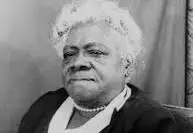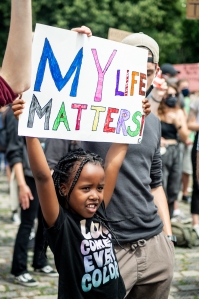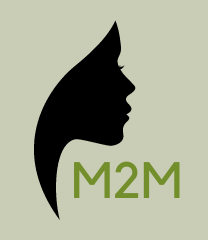
A Passionate Mind in Relentless Pursuit: The Vision of Mary McLeod Bethune
By Noliwe Rooks (@noliwerooks). Penguin Press. 208 pages. Out Jul. 23.
Mary McLeod Bethune (1875-1955) stands as a towering figure in the annals of American history, renowned for her pioneering work in education and her unwavering advocacy for racial and gender equity. Born into a society plagued by the scourge of segregation and systemic oppression, Bethune’s life and intellectual contributions were inextricably intertwined with her larger vision of empowering marginalized communities through the transformative power of education.
Bethune’s seminal achievement, the founding of the Daytona Normal and Industrial Institute for Negro Girls (later renamed Bethune-Cookman College) in 1904, was a bold step towards dismantling the barriers that denied Black women access to quality education (Perkins 2015, Boukari 2005). Beyond imparting academic knowledge, Bethune’s was a catalyst for personal and societal advancement. The college is the only Historically Black College and University (HBCU) founded by a woman.
However, Bethune’s impact extended far beyond the confines of the classroom. She was a prominent figure in the National Association for the Advancement of Colored People (NAACP) and the National Council of Negro Women (NCNW), where she tirelessly advocated for civil rights, economic opportunities, and the recognition of Black women’s contributions to society. Her vision transcended the boundaries of racial equity, as she also championed gender equality, recognizing the intersectional nature of oppression faced by Black women (Ochefu 2021, Battle 2016).

Bethune’s intellectual prowess and unwavering commitment to social justice garnered her the respect and admiration of influential figures, including President Franklin D. Roosevelt, whose administration she advised on policies affecting Black Americans during the New Deal era (Maranzani 2021, Evans 2023). This influential role prompts inquiries into the extent of her involvement in political decision-making and her relationships with powerful contemporaries.
As we delve deeper into Bethune’s life and work, several questions arise: What were the key challenges and obstacles she faced in her pursuit of education and civil rights, and how did she overcome them? How did Bethune’s vision of racial and gender equity influence her approach to education and leadership? What aspects of her life and work have received less attention or recognition, and why is it important to shed light on these contributions?
While Bethune’s legacy as an educator and civil rights icon is widely celebrated, scholars have argued that her contributions to the labor movement and economic empowerment of Black Americans have been overshadowed by her educational and civil rights work. Additionally, some aspects of her life and work remain debated or unclear, prompting further research and analysis.
We hope you will secure a copy of the new book, A Passionate Mind in Relentless Pursuit: The Vision of Mary McLeod Bethune by Noliwe Rooks. Does it answer your burning questions about McLeod Bethune? Where are you most curious about this incredible life, and what else can history teach you about her?
References
Battle, Nishaun. “From Slavery to Jane Crow to Say Her Name: An Intersectional Examination of Black Women and Punishment,” in Meridians: JSTOR, vol 15, no. 1 (2016) pp. 109-136
Boukari, Safoura. 20th Century Black Women’s Struggle for Empowerment in a White Supremacist Educational System: Tribute to Early Women Educators, University of Nebraska, Lincoln: Information from the Women’s and Gender Studies Program (2005)
Evans, Farrell. “What was the Role of FDR’s ‘Black Cabinet’?” History Classics (2023)
Maranzani, Barbara. “The Unlikely Friendship of Eleanor Roosevelt and Mary McLeod Bethune,” Biography: Women’s History,” Biography: Women’s History, (2021)
Ochefu, Amara. The History of Intersectionality and the Black Feminists Behind It, Assembly: a Malala Fund Publication, 2021
Perkins, Linda. “Bound to Them by a Common Sorrow”: African American Women, Higher Education, and Collective Advancement,” The Journal of African American History, vol. 100, no. 4, African American Education, Civil Rights, and Black Power (Fall 2015), pp. 721-747 (27 pages)
Additional Readings on McLeod Bethune
1. National Park Service: Mary McLeod Bethune Biography (https://www.nps.gov/people/mary-mcleod-bethune.htm)
2. Bethune-Cookman University: Mary McLeod Bethune Legacy (https://www.cookman.edu/history/our-founder.html)
3. National Women’s History Museum: Mary McLeod Bethune (https://www.womenshistory.org/education-resources/biographies/mary-mcleod-bethune)
4. National Museum of African American History and Culture: Mary McLeod Bethune (https://nmaahc.si.edu/explore/stories/mary-mcleod-bethune)
5. The Mary McLeod Bethune Council House (https://www.nps.gov/mamc/index.htm)
6. Encyclopedia Britannica: Mary McLeod Bethune (https://www.britannica.com/biography/Mary-McLeod-Bethune)
7. The Mary McLeod Bethune Legacy (https://www.marymcleodbthunecouncilhouse.org/legacy)
